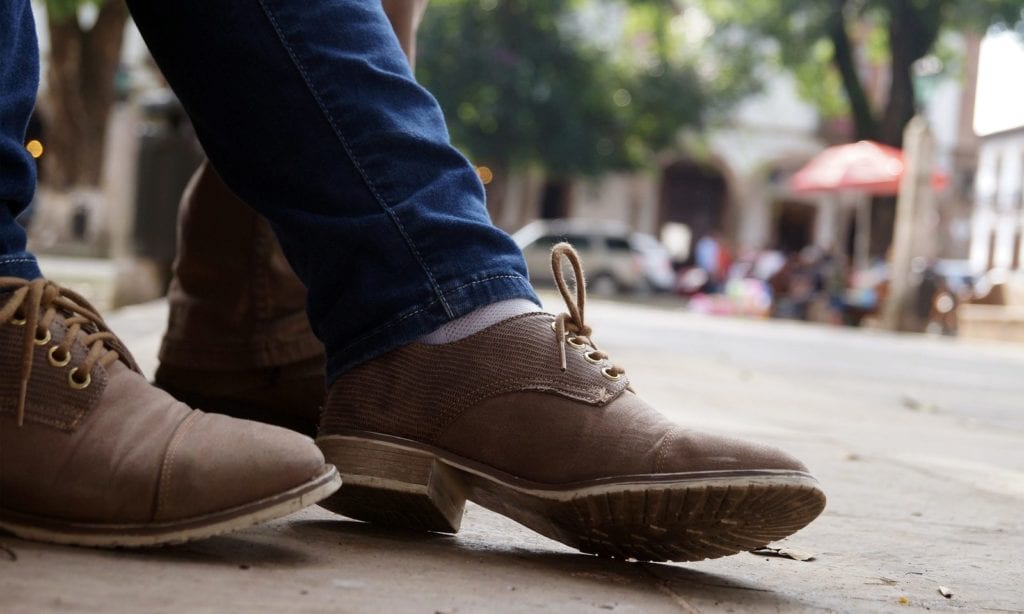What can be done for Neuropathy in the Feet?

Introduction
Neuropathy in your feet can be very painful and uncomfortable, and in the case of neuropathy in diabetics, it can be dangerous too. Being able to recognise the problem early and take the necessary measures to deal the problem is essential. Wearing the right shoes for neuropathy, inspecting your feet regularly and generally taking care of your feet are all ways to mitigate neuropathy.
What does Neuropathy feel Like?
The signs of peripheral neuropathy, which is neuropathy of the extremities such as feet has specific symptoms and signs you can look out for. These include things like prickling or tingling in your feet, having the feeling of pins and needles at times, as well as throbbing, jabbing and burning sensations in the feet or sharp unbearable pain in feet and toes. You may also have a feeling that your feet are freezing. Other indications of neuropathy of the feet include a gradual numbness of the feet to the point that you have no feeling in your feet.
This is often experienced with diabetic neuropathy and can be extremely dangerous, as a diabetic can often not feel if their feet are injured, cold or wet and can lead to infections setting in. Extreme sensitivity to touch can also occur, this can have an effect on your sleeping patterns as well as just the touch of the sheets or blankets on your feet can cause pain which prevents you from being able to sleep.
The sensations you feel in your feet can also spread into your legs. This can lead to you feeling fatigued and not able to walk properly, and can affect your ability to stand for long periods as well. A feeling of general discomfort, tiredness and pain are all symptoms of foot neuropathy and should be recognised and dealt with as soon as possible.
People who have neuropathy of the feet often tend to lean or keep their feet further apart to enable them to be able to balance better, and will remove their shoes when driving, or whenever possible to try to alleviate the symptoms. Wearing the right shoe will mitigate the symptoms and keep your feet comfortable and supported throughout the day.
Do Compression Socks help with Neuropathic Pain?
If you find you suffer from peripheral neuropathy, compression socks can provide cushioning for your feet and help you to prevent injury to them. Compression socks that are constructed of synthetic material often have the ability to wick away moisture and this is also a very good thing for neuropathic feet and can help you to prevent infections or foot ulcers.
If you are going to be wearing compression socks, you need to make sure that you wear them properly in order to prevent worsening your neuropathy. If the sock is put on incorrectly, you can apply pressure to your feet unevenly and this can lead to your foot getting damaged, especially in people who have thinner skin such as the elderly people.
If you are suffering from diabetic neuropathy compression socks can be hazardous as they tend to limit the blood flow to your feet and this can in fact worsen foot injuries and delay healing of any sores, or wounds you may have.
Compression socks in diabetic neuropathy should be avoided as diabetics tend to suffer from poor circulation in the extremities of the feet, edema, which is swelling of the feet and lower legs and wearing compression socks can worsen these conditions.
What Foods are good for Neuropathy?
If you are suffering from peripheral neuropathy you can help to mitigate the symptoms by eating correctly, including foots with vitamin B12 in your diet is essential. These foots include things like poultry such as chicken, fish and eggs. Lean meat and cereals are also great and you can also supplement your diet with a vitamin B12 supplement. Along with good nutrition you should also try to limit your intake of alcohol as this may worsen your peripheral neuropathy, especially if you are diabetic and that is the cause of your neuropathy.
Avoiding tobacco products is also a great idea if you suffer from diabetic neuropathy. Remember eating a healthy balanced diet is essential, not only to be able to limit or mitigate the effects of neuropathy, but also overall. It is especially important if you are a diabetic. Diabetic neuropathy can lead to much more serious problems in your feet as when you suffer from this you tend to loose sensation in your feet and this can lead to you injuring your feet without knowing about it.
This is dangerous as it can lead to infections that can, and often do, lead to having to have your foot amputated. So keeping to a healthy diet, getting the vitamins you need, and inspecting your feet often are all essential for diabetic neuropathy sufferers.
Conclusion
If you suffer from neuropathy of the foot, you will find that you suffer from painful, throbbing feet or on the other extreme you may find that your feet are numb and you cannot feel anything. In either instance managing your neuropathy is imperative and wearing a great pair of shoes that is designed to give you the comfort and support you need when suffering from this type of ailment.